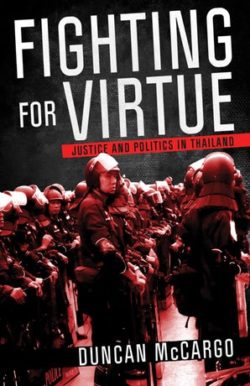Justice and Politics in Thailand

This is a deeply researched, highly original and ultimately frightening book (Chris Baker, Bangkok Post)
I held a Leverhulme Major Research Fellowship from 2011–14, which funded me to spend the whole of 2012 conducting ethnographic fieldwork and interview research on the Thai justice system. This research was published as Fighting for Virtue: Justice and Politics in Thailand (Cornell 2019), a book that was conceived during a 2010 residency at the Rockefeller Foundation Bellagio Center, and was written up primarily during a year in residence at the School of Social Science, Institute for Advanced Study, Princeton.
Fighting for Virtue investigates how Thailand's judges were tasked by the late King Bhumibol Adulyadej (Rama IX) in 2006 with helping to solve the country's intractable political problems—and what happened next. Across the last decade of Rama IX's rule, I examine the world of Thai judges: how they were recruited, trained, and promoted, and how they were socialized into a conservative world-view that emphasized the proximity between the judiciary and the monarchy.
The greatest merit of Fighting for Virtue lies in the evidence that emerges from the hundreds of hours McCargo spent in Thai courts and his myriad formal interviews and informal conversations with “judges, prosecutors, police officers, defense lawyers, defendants and their families, witnesses, academics, journalists, and campaigners”. McCargo lets the judges, and everybody else, speak for themselves (and even incriminate themselves), so we are presented with a multifaceted view of the administration of justice in Thailand (Journal of The Siam Society)
I delve into three pivotal freedom of expression cases that illuminate Thai legal and cultural understandings of sedition and treason, before examining the ways in which accusations of disloyalty made against controversial former prime minister Thaksin Shinawatra came to occupy a central place in the political life of a deeply polarized nation. I navigate the highly contentious role of the Constitutional Court as a key player in overseeing and regulating Thailand's political order before concluding with reflections on the significance of the Bhumibol era of "judicialization" in Thailand.
Here's a short video of me discussing the book with Ariana King from WEAI, Columbia University.
Here's a podcast interview with Nick Cheesman about Fighting for Virtue.
Here's a podcast interview with Aim Sinpeng about Fighting for Virtue.
Here's a review by Chris Baker
Here's a blog post I wrote when Fighting for Virtue came out.
Fighting for Virtue makes an original contribution to critical debates about the rule of law in Southeast Asia. It will be an essential point of reference for anyone interested in understanding the morbid politics of the final decade of King Bhumibol's reign. For both these reasons it deserves to be read widely (Contemporary Southeast Asia).
I've written a few articles that provide useful context for the arguments in Fighting for Virtue, notably a review of some important texts on the Thai judiciary, a discussion of alternative meanings of judicialization, and an ethnographic study of criminal cases in the lower courts.
I have also published a number of articles on aspects of transitional justice, including a 2015 Journal of Democracy piece which is highly critical of what I term the ‘transitional justice industry’. Neither truth commissions nor international tribunals have lived up to the high hopes invested in them over the past two decades. I believe that both the Thai case and broader developments in transitional justice illustrate the limitations of legalism as a mean of solving political problems. Ultimately, Fighting for Virtue argues, states and societies need to put greater trust in politicians, rather than creating ever more elaborate mechanisms that allow courts and judges to regulate politics.
A list of my publications on justice and politics in Thailand and beyond is available here
